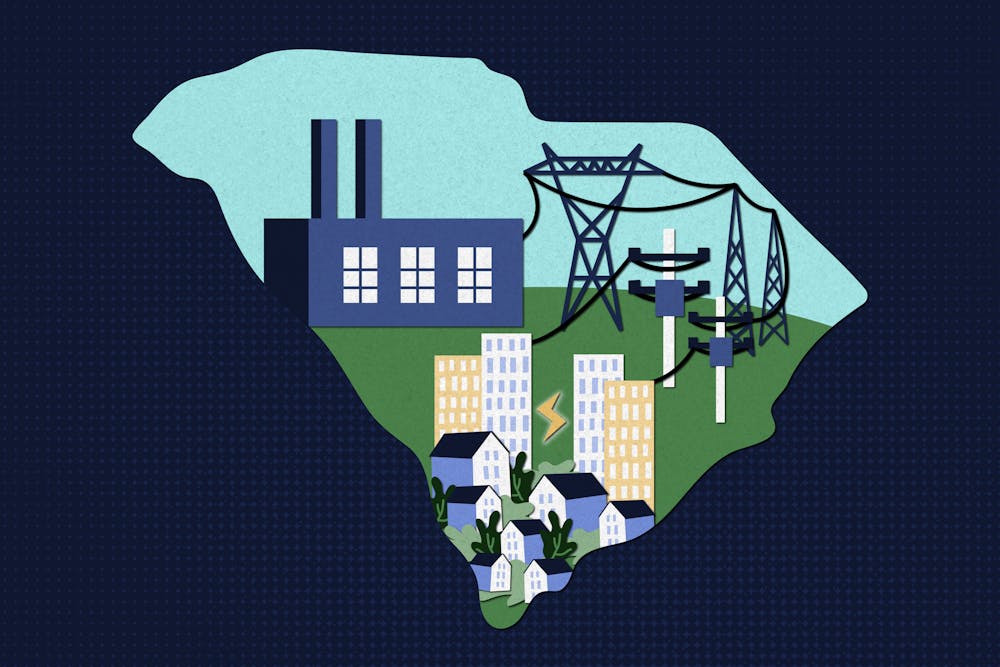South Carolina's Nexus for Advanced Resilient Energy was designated a Regional Technology and Innovation Hub in October due to its work in creating efficient ways to store and distribute energy.
SC Nexus is one of 31 consortium entities recognized as an innovation hub by the Economic Development Administration. More than 400 entities across the nation applied.
The organization works with the South Carolina Department of Commerce, universities and private sector companies to research energy improvements. Other entities' efforts are focused on areas such as quantum computing, environmental mitigation and biotech.
SC Nexus is comprised of USC, Clemson, South Carolina State, Savannah River National Lab, the South Carolina Technical College System and the South Carolina Council on Competitiveness.
One area the entity has concentrated on is how to produce cleaner energy within large-scale grid batteries. The recognition helps SC Nexus to acquire more money for future projects on the topic and others.
Julius Fridricksson, the vice president of research at USC, said the recognition was a huge accomplishment, since only a few number of entities receive it.
“Normally South Carolina doesn't get these kinds of awards,” Fridriksson said. “Whenever you go for something like this, you have to give it your absolute best, but you also have to understand that the chance of failure is really high. So when you actually succeed, I mean, you're elated.”

The phase one proposal indicated how likely a region could experience technological and economic growth, said Fearn Gupton, the regional innovation officer for SC Nexus.
The organization has the capacity to be a global leader in advanced energy within 10 years due to its building blocks of universities with strong engineering programs and access to the nearby Savannah River National Lab, Gupton said.
SC Nexus' EDA phase one proposal applying for the designation was the only one that had bipartisan support, Bill Mustain, the associate dean for research at USC, said. The support, he said, shows how important SC Nexus' work is in large-scale grid batteries.
“We had both Democrat and Republican support,” Mustain said. “And to me, that's also something to be very happy about and proud of.”
The private sector companies that make up SC Nexus usually compete against each other, Gupton said. But they are working together to advance South Carolina technologically and economically.
“Even if they're competitors, they're taking this opportunity to look and see how they can work together to to serve this greater need,” Gupton said.
Since receiving this recognition, SC Nexus has been working on the phase two grant application, which will grant between $40 million and $75 million to help projects get done, Gupton said.
The application will include six different projects. Four will be technology based, one will be workforce based and the other one will be entrepreneurship and innovation-focused. Gupton said the projects will allow South Carolina to continue to have regional success in new energy developments.
“Once we get through (the phase two application), we'll be able to take a step back and really start dreaming about the big picture and making sure that everyone across the state understands what this opportunity means,” Gupton said.
The recognition boosted confidence for SC Nexus as a whole, Fridricksson said.
“We now also will be going for other types of grants from the federal government, from the Department of Energy and probably (the) Department of Defense,” Fridriksson said. “So, for us to boost morale always is important.”
Fridriksson said SC Nexus’ strongest part, with regards to energy, is energy storage in large-scale batteries. New grants will allow for progress in battery projects, Fridriksson said.
SC Nexus is working on having very large batteries on the electrical grid. The energy would be stored in the batteries and could then be depleted from them as needed. This would be a way to more effectively work with energy.
Mustain said students and faculty have been working on and researching batteries for three decades. Now, more than 100 people are working on battery research, which makes USC stand out.
Fridriksson and Mustain said this recognition will open up the university to more opportunities for students in engineering and science for undergraduate and graduate students.
“Suddenly, you're going to have projects in a battery class or in a thermodynamics class, where you're solving a SC Nexus problem," Mustain said. "You're not just solving some problem that came out of a book."
There are high hopes and expectations that companies — in addition to students being attracted to South Carolina and USC — will also come to the state to enhance energy-related infrastructure, Gupton said.
“We want to be that Silicon Valley for energy research," Fridriksson said. “We certainly expect that companies will come to South Carolina, as well as students that are going to be interested in not just the education but also the employment that is going to come along with this infusion of both capital, as well as new companies.”
Fridriksson said people will probably not see any major effects from new projects until next year at the earliest, due to large-scale problems that need new solutions and advanced energy to solve.
Still, Fridricksson hopes the recognition will bring national attention to the region's energy projects and will draw in companies and students to the state.
"The next step is to actually take all that those pieces of the infrastructure and then build something big," Fridricksson said. "That's what we're going to be working on now since we got the designation."

